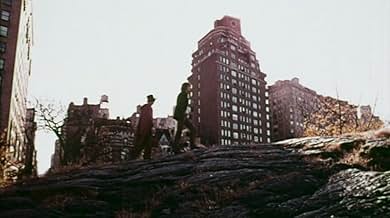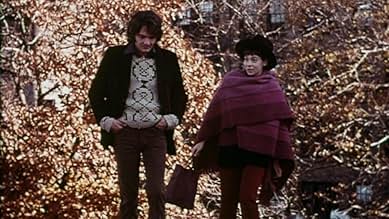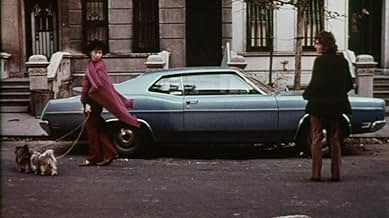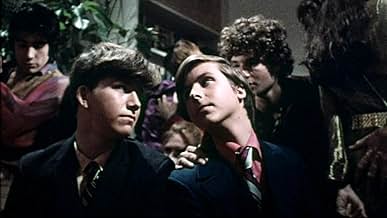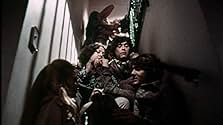After a young man graduates from a prestigious college, he rebels by preferring a carefree existence rather than the life of fighting the rungs within the treacherous American corporate ladd... Read allAfter a young man graduates from a prestigious college, he rebels by preferring a carefree existence rather than the life of fighting the rungs within the treacherous American corporate ladder. For his means of survival he becomes a New York cab driver.After a young man graduates from a prestigious college, he rebels by preferring a carefree existence rather than the life of fighting the rungs within the treacherous American corporate ladder. For his means of survival he becomes a New York cab driver.
- Awards
- 1 nomination
Arthur Anderson
- Floorwalker
- (uncredited)
Nancy Andrews
- Passenger With Crying Child
- (uncredited)
Pat Ast
- Fat Girl at Party
- (uncredited)
- Director
- Writers
- All cast & crew
- Production, box office & more at IMDbPro
Storyline
Did you know
- TriviaMGM, then under the authority of infamous studio head James Aubrey, picked up the film for distribution, then dumped it when it tested poorly. Had MGM gone through with it, it would have been one of a slew of many "with-it" youth pictures they released that year, including The Magic Garden of Stanley Sweetheart (also shot in NY), The Strawberry Statement, and Zabriskie Point. It was picked up by Plaza Pictures, a smaller company that quickly went defunct soon after. They retitled it Pigeons, and edited nearly twenty minutes from the runtime. MGM dip whip up a poster for the film during the time they test-screened the picture. Their principal design was used for the Scorpion DVD release, though the DVD actually contains the shorter retitled recut.
- ConnectionsFeatured in Dusk to Dawn Drive-in Trash-o-Rama Show Vol. 7 (2002)
Featured review
This offbeat 1970 NY-set character study resembles its central character too closely and is therefore something of a cop-out. Jonathan (Jordan ANGEL, ANGEL DOWN WE GO Christopher) is a lazy Princeton graduate who earns what he describes as 'an easy living' driving a NY taxi 'Because I want to show the world the back of my neck'. Together with his frustrated virginal ex-army pal Winston (Robert Walden), he lives an aimless existence disinterestedly weaving his cab through the often traffic-clogged city streets, drifting through loveless and seemingly joyless no-strings sexual encounters and occasionally chasing pigeons before embarking on a tentative relationship with his new neighbour, college drop-out Jennifer (Jill O'Hara, in her only film appearance) who - in counterculture era drop-out fashion - is trying to find herself. But can Jonathan discover true happiness in his own backyard or is he destined to forever fly free like the pigeons he casts sidelong glances at and occasionally tries to kick? Although this ticks many of the early 70s cinema boxes (there are the obligatory party scenes, generation-gap themes, swishy kaftan-wearing homosexuals, casual sexual encounters, characters bonding during a rooftop pot-smoking session, grungy wintry locations, ghastly woozy love songs warbling away on the soundtrack, a self-loathing misanthropic anti-hero and even a somewhat out-of-place car chase), the sum of the parts don't ultimately add up to a particularly satisfying whole. This is due in no small part to its smug central character whose inner monologues tend to resemble a series of clichéd and generally unfunny observations (e.g. 'It's OK to be homely, lady, but you're abusing the privilege' - which is one of the better zingers on offer) and whose selfish behaviour is most likely inherited (he has a similarly solipsistic mother still pining for her late husband and a lecherous and unfeeling stepfather) but don't really give the film the emotional or dramatic heft of the same year's far superior FIVE EASY PIECES. However, there are a few residual pleasures in those grungy wintry Big Apple locations, a catchy electronic central theme and the window cracked open on a vanished era that may have mostly existed through the refracted lens of a movie camera rather than in actuality. And it's a real obscurity that seems to have virtually vanished following its original release in its longer-titled full-length form and subsequent re-release in the retitled and abridged (86 minutes) form as PIGEONS that I viewed thanks to its apparent one-off appearance on UK TV in the mid-90s. The current scarcity factor alone makes it a must for 'Cinema Obscura' buffs.
- How long is The Sidelong Glances of a Pigeon Kicker?Powered by Alexa
Details
Contribute to this page
Suggest an edit or add missing content

Top Gap
What is the English language plot outline for The Sidelong Glances of a Pigeon Kicker (1970)?
Answer
